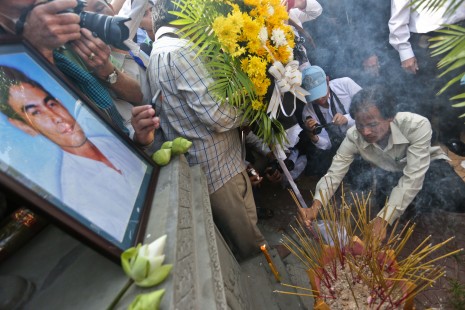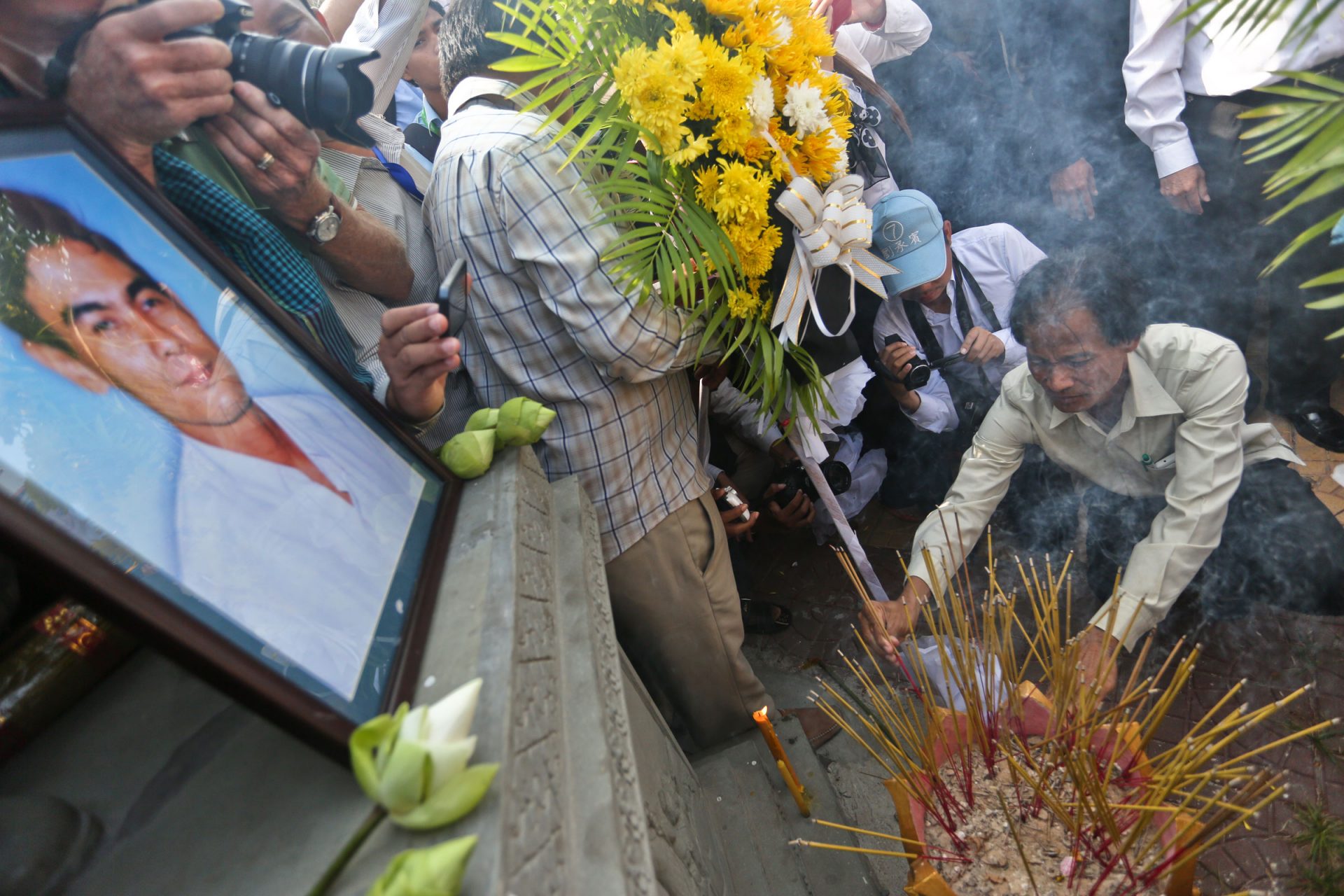Ten years ago Wednesday, union leader Chea Vichea walked to his favorite newsstand in front of Wat Lanka to read the day’s headlines: Prime Minister Hun Sen had ordered spending cuts, health officials were trying to handle the first outbreak of bird flu in Southeast Asia and celebrations for Chinese New Year were underway.
A day later, Chea Vichea had become the day’s headline: “Union Chief Chea Vichea Gunned Down.”

In broad daylight at around 9 a.m. on January 22, 2004, the popular leader of the Free Trade Union (FTU) and longtime supporter of the political opposition was assassinated.
Two bullets killed Chea Vichea. They were fired at pointblank range—one hit his chest and another his head—by a man who didn’t even bother to mask his face.
More than 10,000 mourners marched in the union leader’s funeral procession.
To commemorate the 10th anniversary of Chea Vichea’s assassination, Chea Mony, his brother and current FTU president, along with friends, colleagues and about 100 supporters marched from the FTU’s headquarters on Street 360 to Street 51, past the newsstand where he was killed outside Wat Lanka, and ending at the memorial statue to Chea Vichea across the street from the pagoda.
Although City Hall had banned the march, the police presence at Wednesday’s event was limited, and the marchers were not stopped along their route.
After reaching the statue, about 300 people participated in a memorial ceremony there, with family members, union leaders, friends and politicians taking to a microphone to remember the famed unionist—and to compare his death to other recent shootings at the hands of government security forces.
“We pay respects to Chea Vichea’s soul, and the souls of other people who were killed at Kbal Thnal bridge and the garment workers [who were shot] just because they were protesting for a $160 salary,” Mr. Mony said, referring to two separate protests in September and January at which police and military police killed bystanders and stone-throwing protesters.
Several opposition politicians, most prominently CNRP President Sam Rainsy and Vice President Kem Sokha, also used the ceremony to talk about the suppression of recent strike demonstrations, and to reiterate their support of the garment workers’ demand for a $160 minimum wage.
“Today, I appeal to the workers and union leaders, join each other and continue to struggle…. Please don’t be worried or scared, because we have nearly reached our goal [of $160],” Mr. Sokha said in his speech.
Yin Sokhann, a 29-year-old garment factory worker, said Chea Vichea remains a role model of resistance.
“I love Chea Vichea because he is a hero for us garment workers and he is a person who helped us in demanding an appropriate salary,” she said after the ceremony.
Ms. Sokhann and her coworkers at Sangwoo (Cambodia) Co., Ltd., drawing on the example of Chea Vichea, said they would not settle for the $100 monthly minimum wage the government has offered.
“$100 is not enough to pay for our living expenses. Prices at the market are going up, and we will keep demanding a minimum wage of $160 from the government,” she said.
Nuon Kim Sry, mother of Born Samnang, who was arrested alongside Sok Sam Oeun for the killing of Chea Vichea and sentenced to 20 years’ imprisonment, also attended the march and ceremony.
Both men were long considered scapegoats and released last year though they had both spent five years in prison for a crime they did not commit.
Now, a decade after the murder, no one has ever been held to account or a motive identified for the assassination of the country’s most prominent union leader.
Mr. Mony blames the lack of progress on the government’s involvement in the assassination of his brother.
“I don’t understand why the murderers cannot be found,” said Ath Thorn, president of the Cambodia Coalition of Apparel Workers’ Democratic Union. But, he said, Chea Vichea’s death would not deter unions from pursuing higher wages and better working conditions.
“The killing of Chea Vichea cannot discourage our workers, but only increases the protests demanding justice,” he said at the ceremony.
Rong Chhun, president of the Cambodia Independent Teachers Association, said Chea Vichea’s memory lives on.
“Even if the murderers shot him dead 10 years ago, we remain his friends and still remember him as a hero.”




